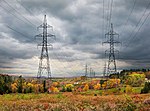This page is dedicated for the mapping of power-related infrastructure in Quebec.
Background
The Quebec power grid operates independently from the rest of the North American grid and uses transmission voltages from 735 kV all the way down to 69 kV. Distribution lines are usually 14.4 kV and 25 kV. The whole Quebec grid, including distribution (except for some small local distributors), is a provincial monopoly under the crown corporation Hydro-Québec. The Quebec grid generally brings power from the hydroelectric power plants in the north to the load centres in the south.
All existing power lines in Quebec presently mapped can be seen in OpenInfraMap
Voltages
| Voltage
|
Network
|
Notes
|
Appearance
|
Example
|
| 735 kV
|
Transmission
|
Backbone of the Québec grid, linking the population centres in the south to the hydroelectric power plants in the North
|
Single-circuit towers
|

|
| 450 kV
|
HVDC Interconnect with New England
|
T-shaped tower, lattice or pole, to support two bundles of three conductors on each side. The direct current power line sometimes uses two poles or a wider, pyramidal, self-supporting lattice structure for angle towers.
|
|
| 315 kV
|
Used mainly in the big population centres to feed distribution substations, and for the transmission of power from power plants
|
A combination of double-circuit three-level pylons and single-circuit delta pylons
|

|
| 230 kV
|
Regional transmission
|
| 161 kV
|
Used mainly by Alcan for their Power Network, in Saguenay–Lac-Saint-Jean, they sell their surplus electricity to Hydro-Québec. Also in use in the Gaspé and Côte-Nord area.
|
| 120 kV
|
Regional transmission. Feeds most of the distribution substations.
|
| 69 kV
|
Regional transmission. Used for more rural locations.
|
Carried mainly on wooden h-frames
|
|
| 49 kV
|
Regional transmission in the Eastern-Townships. Projects are currently under way in order to replace the 49 kV network with 120kV
|
|
|
| 25 kV
|
Distribution
|
Used in the majority of the distribution system.
|
Ordinary sized poles in rural areas and back alleys, or underground cables. Multiple circuits may not be obvious from aerial photography. 25 and 14.4 kV systems are generally looped, with many single-phase or three-phase branches and backup connections from other substations provided by open disconnector switches at the end of feeders.
|

|
| 14.4 kV
|
Used in the majority of the distribution system. Single phase branch off the 25 kV line
|
| 120/240 V split-phase, 120/208 V three-phase, 347/600 V three-phase
|
Standard voltage for end customers. These voltages are supplied by a pole-mounted transformer (in rural area or back alleys) or pad-mount transformer (in cities).
|
Tagging recommendations


